How About This Presents Dr. Tara Taylor
Interviewing a professor of mathematics who also enjoys running, gardening and family life.
Welcome to Atlantic Canada Mondays, a regular feature of How About This where we interview interesting residents of the Canadian provinces of New Brunswick, Nova Scotia, Prince Edward Island and Newfoundland and Labrador. Today we’re interviewing Dr. Tara Taylor, a professor of mathematics and statistics at St. Francis Xavier University in Antigonish, Nova Scotia. You can also find Tara on Twitter. Over to Tara!
1. Here's an obvious starting point: why did you choose to enter academia, specifically mathematics? Did it reflect your childhood interests or was it something you discovered later in life?
I have always loved learning. I love to read, and have read voraciously my whole life. I wanted to be a writer. I was good at math from a very young age but I had a horrible experience with a teacher in grade 1. She accused me of cheating because I finished a sheet of 100 questions really quickly and it was all correct. That stayed with me.
It took a long time to see myself as a real mathematician, I still have imposter syndrome. I've always loves patterns and symmetries. I did have some amazing teachers though, and I am so grateful for them. My high school calculus teacher was wonderful and encouraging. My high school math teacher helped me become a good tutor for other students. My high school physics teacher told me I was going places. These were all men by the way. I knew that I would go to university, it was expected of me (my mom was a pharmacist and my older brother got his Masters of Accounting).
I honestly would have preferred to go into arts, but I could get a bigger scholarship to go into science and I needed the money. I thought I might do chemistry and go into medicine. In my first year, at the University of Winnipeg, I took intro chemistry and organic chemistry, and I struggled with the labs. I ended up with decent marks and kept my scholarship but I realized that I liked theory more than labwork.
I studied more math and physics, and also took a lot of Classics courses. I had an amazing math professor who also loved literature, and we spent many hours talking about math and literature. He helped me to see the artistic side of math, and really helped me fall in love with it.
When I graduated with my undergrad degree in math, I didn't know what I wanted to do. My professors encouraged me to go to grad school but I wanted a break. I decided to travel. I went to Ireland for a year and worked on organic farms. I came back to Winnipeg (where I grew up) and worked at a home for mentally disabled adults. I decided that I wanted to learn more math, so applied to go to graduate school. The day I found out I had funding I also found out that I was pregnant, so grad school was deferred for a year.
I had originally planned on going to the University of Toronto, but thought that Dalhousie in Halifax would be better for a baby. I had never been to Halifax but wanted to be by the ocean. When I was at Dal, I worked in the math learning centre and loved interacting with students. I started teaching as well. Growing up, I didn't have a plan to become a professor, but I loved learning and teaching so I just kind of fell into it. I feel very lucky that I have been able to do what I love.
When I was finishing my PhD, I needed a job and applied for a job at StFX. I had never been to Antigonish, had never lived in a small town. I started in 2004 and I'm still here.
2. Could you distill your interest and passion for mathematics to a single point or anecdote? (assuming no overlap with question 1)
In my second year of university, I took a math course called linear algebra. It was the first really abstract math course I took, and I loved it. Other students struggled and preferred more computational stuff like in calculus, but I thought this was way more interesting and beautiful.
I often give talks to high school students about math and mention this. One year, StFX was holding a math camp for grade 10 and 11 students and one of my students was a chaperone for the high school students. When I told this story, he said that he fell in love with math when he took the linear algebra course that I taught. He had originally been a chemistry student but switched to math. It was an extremely rewarding moment for me to have things come full circle.
3. On the whole, what impact has your gender had on your professional career? Do you see academic environments becoming healthier and more rewarding places for women to work over time?
This is a big question. All of my high school math teachers and undergrad math professors were male, but I generally felt encouraged and respected by them. I had many wonderful mentors. I was a summer research student with one of my undergrad profs and I am still good friends with him.
It was lonely at times though, often being one of the few females in a class. The scholarship that helped me go to university was specifically to get more females in science, and I know others were resentful of that (even my own brother was).
Research mathematicians are still underrepresented by females (and other marginalized groups), and there are many factors. This is one of the most rewarding parts of my job now, to do things to try and help math be more equitable. My personal experience with math is that females won't do it unless they feel they are very good at it.
Many of my brightest students go on to do education or some other kind of professional service type of career, they often don't see themselves as capable of going on in higher mathematics. So a lot of what I do is talk about my own non-linear path and that I have a life outside of math as well.
I am a single mom and that has definitely affected my career in many ways. I am not able to go to as many conferences or travel to meet with colleagues (one benefit of the pandemic is that there are so many more virtual options). I waited longer than necessary to apply for promotion to full professor. It is a challenge to balance everything, and the pandemic has been brutal. I feel lucky that I had already been promoted to full professor before the pandemic because I've kind of been in survival mode. I've had to focus on teaching so my research has been on the back-burner for a while.
Overall, there has been progress in the academic environment but there is still so much space for improvement. There are challenges for females, but even more challenges for racialized faculty. There are certain faculty and administrators who are resistant to progress, and it can get frustrating.
4. Do you feel that single parents get adequate support in academia, knowing the time demands for both professional and parenting roles?
My kids are 23, 12, and 5. It is definitely a challenge trying to balance things, and I mentioned a few of the issues in the previous question. Sometimes meeting are held in the evenings or the weekends and I don't want to get a babysitter if my kids have been in school all day.
But there are some benefits. I've been able to get a teaching schedule that helps because I don't have early morning classes. There have been many years when I have had 8:15 classes and that has been very stressful. My current department chair is understanding but it isn't always that way.
A lot of my work is based on outcomes - like publishing papers, marking, answering emails, meeting with colleagues - and I have flexibility about when I do that. So I am often up early to do work, or I stay up late. I have to do a lot of multi-tasking, and I have to be very efficient with my time. People often move to new locations for academic jobs so they don't have as much extended family support, this is the case for me. I don't have any family in Antigonish. Even before the pandemic I would be anxious about my kids getting sick, wondering how I would cope.
5. Does being Gen X in today's academic environment have any pros and cons? I'm guessing that Gen X academics are starting to stand shoulder to shoulder with the Boomer generation in terms of seniority.
This is an interesting question that I hadn't really thought of. I do see some impatience from GenX colleagues, we want to make the academy more equitable but older colleagues are resistant. There is a sense that we are waiting for certain people to retire. I should mention that I have wonderful mentors who are Boomers, some have been fighting the good fight for decades.
StFX has changed a lot, going from a Catholic university with only male priests teaching to a secular university with a faculty that is becoming more diverse every year. The faculty formed a union about 15 years ago. I was at a meeting recently and a colleague mentioned that he was waiting for the "old guard" to retire, and is excited about welcoming younger faculty who care more about pedagogy and diversity.
6. I believe you grew up outside of Atlantic Canada. Would you say that Atlantic Canada, NS in particular, is a good place to live? Pros/cons?
Yes, I grew up in Winnipeg. I moved to Halifax in 1999, and Antigonish in 2004. I love living by the ocean.
It took a while to get used to living in a small town. For many years I split my time between Antigonish and Halifax. I even had a little apartment in Dartmouth from 2012-2017 because my oldest daughter was going to high school there (her dad lives in Halifax), and I was able to have a schedule that allowed me to spend 4 nights a week in HRM. So I was able to enjoy city life too.
The drive can be beautiful, but can be very treacherous in the winter. We haven't spent as much time in Halifax since the pandemic started. I have been back to Winnipeg to visit family but Nova Scotia feels like home now - I love being able to go for hikes, go to the beach or lake. I am single though, and my options are pretty limited here. I have tried a few long-distance relationships.
I sometimes get frustrated with resistance to change, I often hear things like "but that's how we've always done it".
Health care is a serious concern. My family doctor is amazing but he will be retiring soon. My youngest child was recently diagnosed as being autistic, so I am concerned about what supports will be available to him.
I love having my own house with a big garden. My garden brings so much joy to me. I have no idea what I'm doing. We are growing veggies and it is a huge adventure. I love that my kids see farms close by. We get a veggie box from a group of local farms. The chair of the math department when I was hired, John Quinn, has since retired but is one of the farmers for the food box. I'm thrilled that my kids see the connection to the food that we eat.
7. What prompted you to become a runner and how long have you been doing it? What are the biggest rewards that you get from running?
I absolutely hated running when I was a kid. My dad was a runner, he was a bit obsessed, he would run marathons. My mom left my dad when I was a baby, he was an alcoholic and refused to change. He did eventually try to become sober, and running was a big part of his recovery.
When I was 21, my older brother ran his first marathon and I watched him and was inspired. I have always struggled with a negative body self-image. My mom had me counting calories by the time I was 8 years old so I had a love/hate relationship with any kind of fitness thing. But I decided to just try running.
It took a long time to get to a point where I ran the whole time instead of alternated between running and walking. I would start with 1 minute of running with 10 minutes of jogging. But it got to a point where I loved it, I could run the whole time and felt so strong and healthy. Now I do it for my mental health more than anything.
I don't aspire to run marathons. I've considered doing a 10K run, but for me, running is solitary. A friend recently described her runs as meetings with herself and that really resonated with me. It helps me clear my mind and try to do problem solving. I have a lot going on, there is a wide age range between my kids so they have very different needs. I often feel pulled in many different directions. When things are feeling especially overwhelming, I know I need to go for a run.
I try to run almost every day. I had covid in March and I was worried about long covid and how awful it would be if I couldn't run anymore. It took a few weeks to recover and get my energy back. At first I could just go for 15 minute walks. I am very happy and relieved that I am back up to being able to run for an hour.
8. What kinds of tools and practices do you use to organize all of the knowledge that you need to be a practicing academic? Do you use any special software or techniques to keep track of everything?
This is an interesting question and honestly I don't use much. I do most of my research with pen and paper. I write my papers using a tool called LaTeX, it is really good for writing math. I use Corel for generating and modifying images. I use Maple and Mathematica for doing some math programming and generating fractals. But most of my work is on paper. I have folders and binders all over my office. I'm lucky I have a big office haha.
9. What's one major thing that you wish more people understood about academia and higher education in general?
I guess I wish that people understood that academia is about learning and the search for knowledge and sharing that knowledge, even though it might not have an immediate practical application and lead to a job. We want to challenge assumptions, look for different perspectives, build collaborations. At its best, we are a community of learners. A love of learning sustains me as a teacher and researcher and as a human, I want to share that love of learning with others. It doesn't have to be math. I try to encourage students to figure out what is meaningful to them.
10. Pretend you wake up one morning and the Internet has been destroyed. What's the first thing you do?
I will put the kettle on for tea as I normally do. I would typically check the internet once the tea is ready, and then do some reading or work so I guess I would read. I'm not myself if I'm not into a good book.
Thanks to Tara for her great interview!




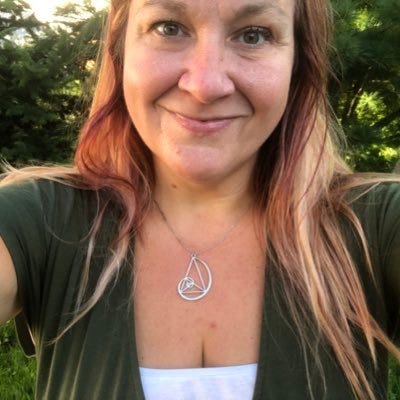

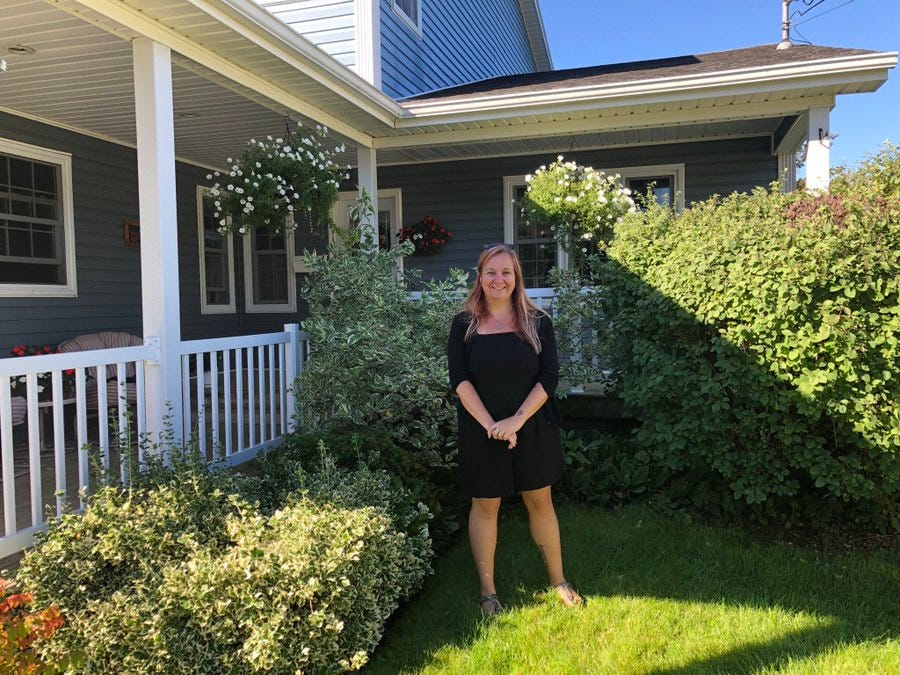
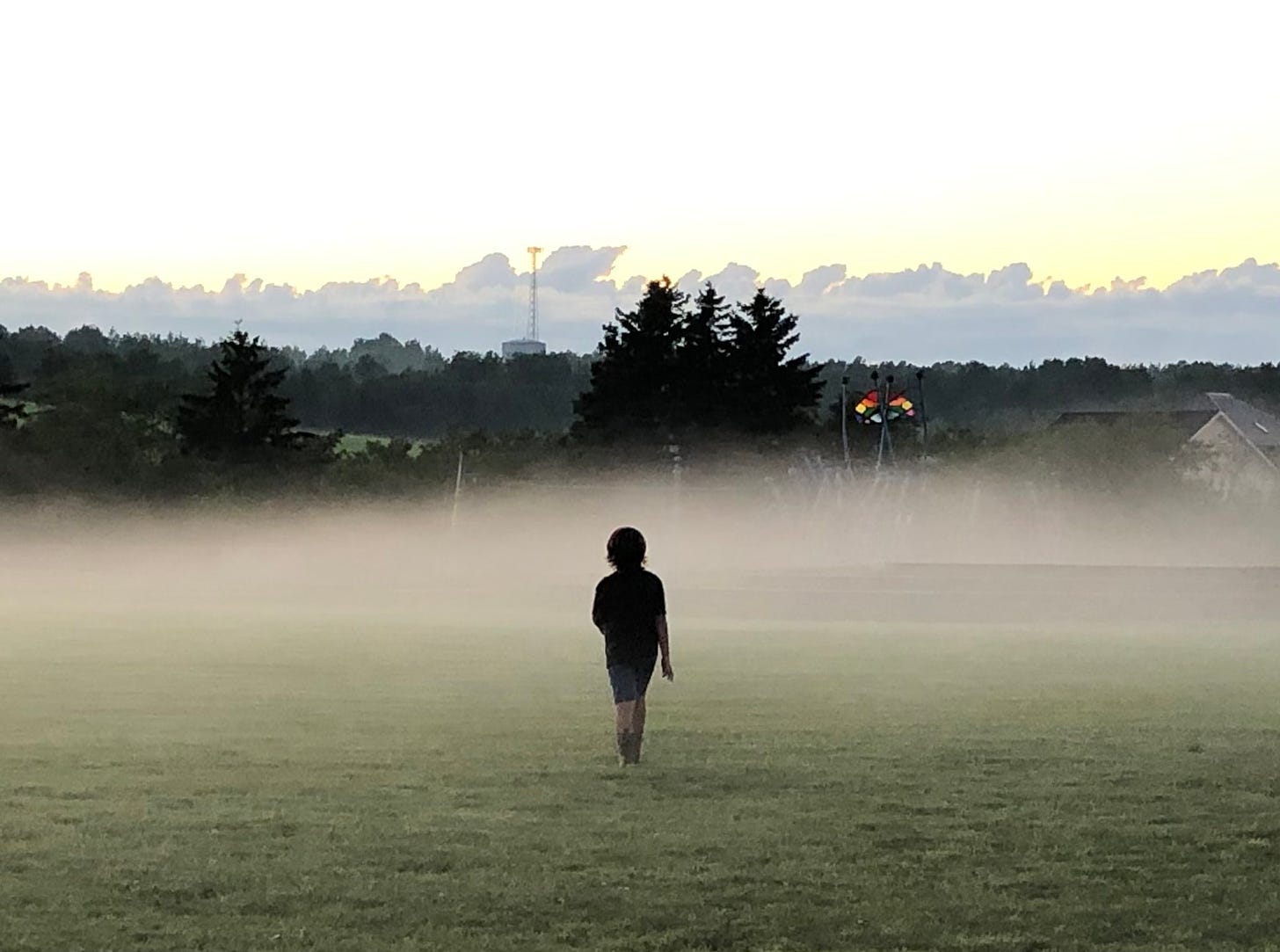

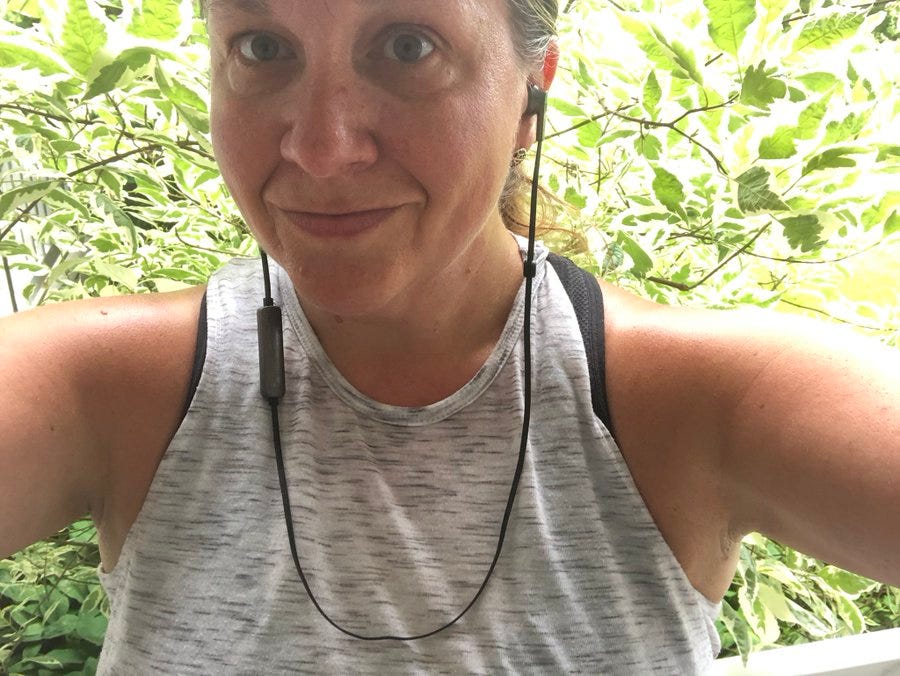
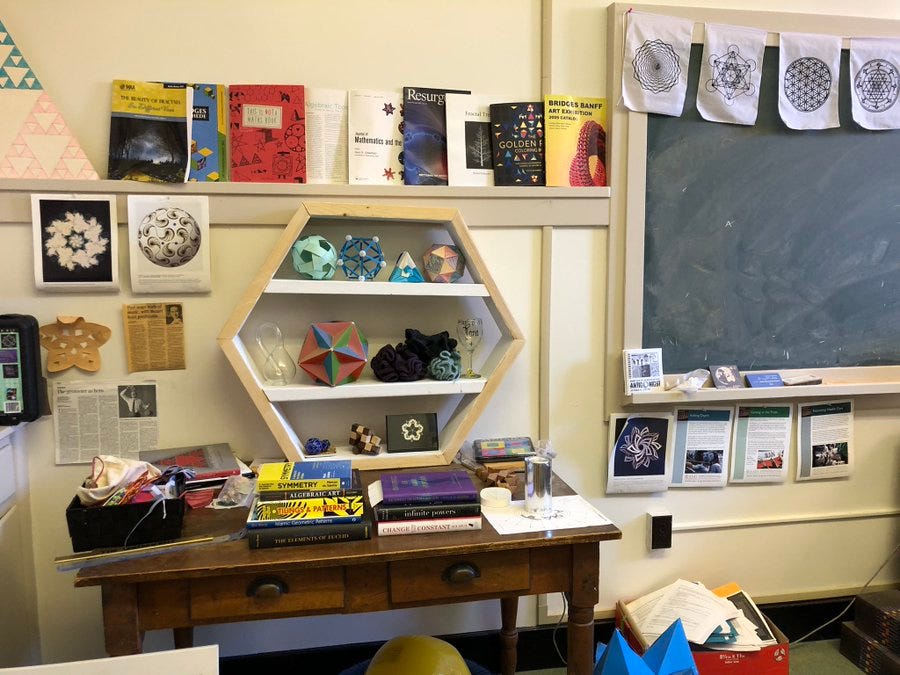
I really enjoyed this, Mark! I enjoyed Tara's take on marrying art with math--and that it actually can be done! I have a degree in English but work as an IT security analyst. I work in a predominantly male company in a predominantly male field, so I understand what she means by feeling alone at times.
I also like the idea of running being "meetings with herself." I've been struggling lately with carving out time for me. I'm not a fan of exercise, but it's something I know I need to do. Perhaps I will imagine my time on the treadmill as meetings with myself. :)
I've always found people who are good at math interesting and infuriating. Infuriating because I barely passed college Calculus I with a C and interesting because of how they are able to see the beauty and the patterns in math. I've tried but I just can't figure it out.
Dr. Tara seems like a very inspirational and brave person. I can't imagine what it's like to build a professional life while also raising a child. As a woman in STEM it's also great to see someone I can look up to. Thank you so much for sharing!